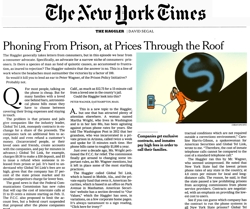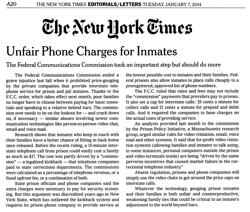The FCC denies prison phone companies’ petitions to delay implementing fair rates, reiterating the need for regulation.
by Aleks Kajstura,
November 26, 2013
Before the FCC’s new regulations lowering the price of calls home from prison even hit the Federal Register, the two largest prison phone companies (Securus and GTL) filed petitions to delay implementation of the new rules while they fight the regulations in court.
But the FCC isn’t backing down. The FCC denied the companies’ petitions, reiterating the need for regulation. Here are the highlights:
As the Commission stated in the Inmate Calling Report and Order and FNPRM, current interstate ICS rates are, in most cases, greatly above costs, and as such, “place an unreasonable burden on some of the most economically disadvantaged people in our nation.” The Commission noted that excessively high ICS rates “discourage communication between inmates and their families and larger support networks.” (¶ 48)
Section 201 of the Communications Act of 1934, as amended (Act) requires that all carriers’ interstate rates be just and reasonable. To be just and reasonable, rates must be related to the cost of providing service. Section 276 additionally requires that payphone rates be fair. Yet for many years, interstate ICS rates have been unreasonably high, unfair, and far in excess of the cost of providing service. Excessive rates have been driven largely by substantial commission payments ICS providers have agreed to make to prison authorities. The Commission relies in the first instance on competition when it can do so to ensure just and reasonable rates. In the Inmate Calling Report and Order and FNPRM the Commission found that “competition for ICS contracts may actually tend to increase the rate levels in ICS contract bids where site commission size is a factor in evaluating bids.” As such, the Commission found that the market forces in the interstate ICS market actually fail to constrain ICS rates. In fact, because the benefits of any “competition” in the ICS market ran to the facility rather than the inmate or their family (i.e., the party who actually paid for the service), rates in many cases were being driven higher. (¶ 3)
The Order also makes clear that regulating ancillary fees “was a necessary aspect of our cost-based reforms, as otherwise providers could simply increase their ancillary charges to offset lower rates subject to our caps.” (¶ 15)
Securus argues that it will suffer significant lost revenues under the new ICS rate regime. The new rules may reduce Securus’ revenue compared to pre-reform levels. But, to the extent that is true, it is because its current revenues are the product of unlawfully high rates. (¶ 35, emphasis added)
And on a technical note, the FCC points out Securus’ hypocrisy:
While Securus faults the Order for ignoring record evidence that the cost of serving some of its facilities is higher than the interim rate caps, Securus’ own cost study underscores the fact that averaged pricing is commonplace among ICS providers, as it is among communications providers generally. The Siwek Report shows that the rates Securus charges for the highest cost institutions fail to recover its self-identified costs of serving those institutions. It indicates that the average cost for “Low 10” group of institutions it serves is $1.71 per minute but that on average Securus charges only $1.10 per minute for calls from these same institutions. Securus does not contend that it is not profitable as a whole or that because its current rates do not cover the cost of serving its Low 10 facilities, it will be obliged to cease serving these locations. (¶ 27)






